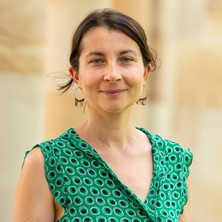2023 IUSSP Early Career Awards WebinarsOnline, 25 April 2024
JOIN US ON 25 APRIL TO CELEBRATE THE 2023 IUSSP EARLY CAREER AWARDEES!
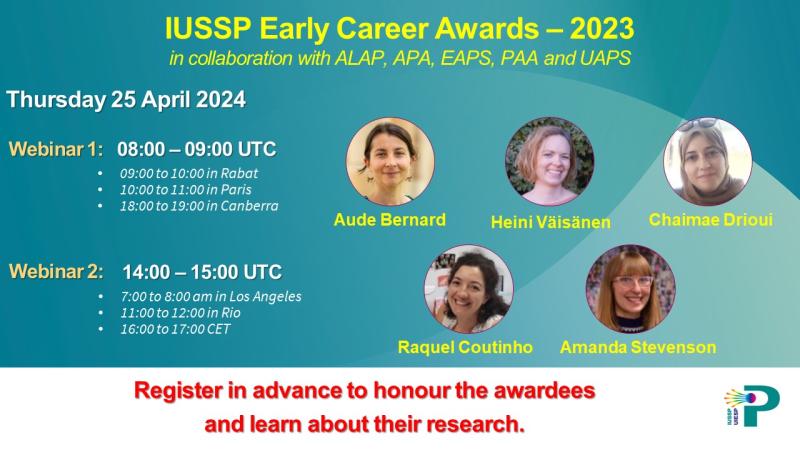
The 2023 IUSSP Early Career Awards ceremony will be held in two separate webinars to better accomodate the various regions of the world.
The webinars will offer awardees the opportunity to present their current work and highlight their research interests. The awardees not present in person at one webinar will share a short video summarizing the key points of their research.
************ IUSSP Early Career Awards:
The IUSSP Early Career Awards were established in 2023 to acknowledge and honour outstanding contributions to the development of our discipline and the broad field of population studies by early career scholars in the various regions of the world and boost the global visibility of their achievements.
The IUSSP is proud to announce the awardees for the 2023 IUSSP Early Career Awards.
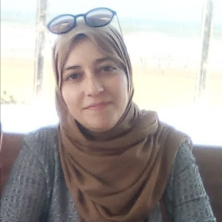 Early Career Awardee, Africa: Dr Chaimae Drioui teaches at the National Institute of Statistics and Applied Economics (INSEA) in Rabat, Morocco. This center opened its doors in 2017, the year that Chaimae graduated as a State Engineer in Statistics and Demography. She joined the Gender, Economics, Actuarial, Statistics, Demography and Sustainable Development Laboratory of INSEA as part of the first class of the PhD cycle becoming the first student to defend her thesis at INSEA and obtain a PhD in demography (in 2022) from a Moroccan institution. Chaimae is a prolific demographer and statistician already listed as the lead author of four peer-reviewed journal publications. Her research is on gender, social inequalities and women's empowerment. Her PhD thesis examined fertility in the context of Middle Eastern and North African (MENA) countries and Morocco: an analysis through the diffusion of innovations and gender approaches. She is active on several UAPS panels and a member of several scientific associations in Morocco. She has published her research in high-quality indexed journals and presented at national and international conferences. The selection committee reviewing her achievements and active engagements in research and teaching noted that she is “a rising star in the demography of Africa”.
Early Career Awardee, Asia and the Pacific region: Dr Aude Bernard is a senior lecturer at the University of Queensland, Australia. Aude has established a regional and international reputation as an innovative migration scholar. Her research has led to conceptual and methodological shifts in the field, created new substantive knowledge, and generated benefits both to the discipline and the region. Aude’s research lies at the cutting edge of the field of internal migration and straddles formal and social demography. Her methodological contributions include developing measurement and estimation techniques that facilitate large-scale international comparisons of internal migration, their spatial patterns, and selectivity. Aude’s work is an excellent example of cross-fertilization in demography. She has successfully applied concepts and methods from fertility – such as tempo effects and parity analysis – to migration to generate new insights into the dynamics of human mobility. Aude has demonstrated leadership capability in several research projects, contributed to capacity building in the region, and also has an impressive track record of service to our discipline.
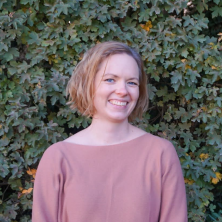 Early Career Awardee, Europe: Dr Heini Väisänen is a tenured researcher at the French Institute for Demographic Studies (INED). Heini is an exceptional early career researcher whose research and career have gone from strength to strength since her PhD in Demography from the London School of Economics and Political Science (LSE). Her research output is substantial with publications in top journals. Heini has tackled under-researched areas in high- and low-income countries and has worked in interdisciplinary groups from different institutions. Through her work on abortion, she has gained a network of international colleagues in Europe, the United States, and Africa. Her most recent research addresses methodological and substantive questions around social inequalities that expose women to the risk of miscarriage and its adverse consequences. She was recently awarded the prestigious European Research Council (ERC) Starting Grant, which acknowledges her rising profile, the quality of her work, as well as her international networks. Heini is one of those rare researchers who applies advanced statistical methods without losing sight of the policy implications of the results.
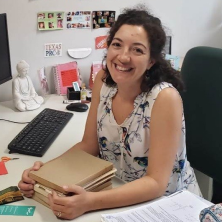 Early Career Awardee, Latin America and the Pacific: Dr Raquel Zanatta Coutinho is a sociologist and demographer whose research interests focus on women's reproductive decisions and the sexual and reproductive contexts and inequalities that mediate the relationship between fertility intentions and outcomes. She is an Assistant Professor and a researcher at the Center for Regional Development and Planning (Cedeplar) at the Universidade Federal de Minas Gerais (UFMG), Brazil. Raquel received her PhD from the University of North Carolina at Chapel Hill with a dissertation on “The Transition to Low Fertility in Brazil.” Raquel has extensive teaching experience both at the undergraduate and graduate levels. She was the principal investigator in 2021 for projects on “Women's perception of obstetric care received in Belo Horizonte and its consequences for women’s and children’s health” and “Sexual and Reproductive Health, Gender and Conjugality in Minas Gerais in times of Covid-19”. Raquel has published in prestigious journals, such as Demography, and holds the distinguished Brazilian National Council for Scientific and Technological Development (CNPq) Fellowship for Research Productivity. Raquel’s research has documented Brazilian women’s lack of reproductive rights, as well as the effects of the Zika and COVID-19 epidemics on the number of live births and fertility rates in Brazil.
 Early Career Awardee, North America: Dr Amanda Stevenson is an assistant professor at the Department of Sociology at the University of Colorado Boulder. Amanda has established an outstanding record of research on fertility leading a research project that has shown the population-level socio-economic impacts of increasing women’s access to contraception. Although early in her career, she is recognized as a national leader in this area. She has an outstanding publication record and has also communicated her research results beyond the scientific community to the public through opinion pieces and by providing expert testimony in court cases. In addition to her research accomplishments, Amanda is an outstanding teacher. In her research and other activities, Amanda takes seriously our collective scientific responsibility to study and communicate the ways that society and policy impact women’s reproductive lives. It is this commitment to the highest standards of population science and to real people carrying out their individual reproductive lives that underlies the work of this remarkable young scientist.
|

